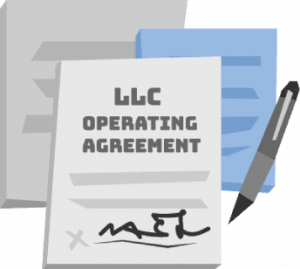How to Start an LLC in Rhode Island
If you’re looking to start a business in Rhode Island, forming an LLC is a great way to do it! LLC owners benefit from liability protection for their personal assets against business debts and judgments, plus flexibility in management structure.
They also have the option of choosing a default method of federal tax similar to what sole proprietors and general partnerships receive, or being taxed more like a corporation. In short, a Rhode Island limited liability company is perfect for anyone who values versatility in their business operation.
To form your RI LLC, you’ll file Articles of Organization paperwork with the Rhode Island Department of State, Business Services Division and pay a $150 filing fee.

1. Name Your LLC
First things first, you need a name—you can’t file your Articles of Organization without knowing what you’re calling your LLC. There are a few rules you’ll have to follow in order to make sure the name is valid in Rhode Island (those rules are outlined in R.I. Gen. Laws § 7-16-9):
- Your name must be distinguishable (unique) among existing Rhode Island businesses.
- It needs to include an identifier like limited liability company or LLC.
- It can’t contain words or abbreviations that might suggest your LLC is a different type of entity.
To check the availability of your business name, use Rhode Island’s business search.
Rhode Island allows applicants to reserve an LLC name for up to 120 days (with the option of renewing after the expiration of that first reservation) by filing an Application for Reservation of Entity Name. Submit the form and a $50 filing fee to the Rhode Island Department of State, Business Services Division.

2. Register Your Domain Name
Your domain name is your business’s online web address. It’s what customers use to find your business offerings online. An online presence you own is essential for any business.
Finding and securing the perfect domain name can feel overwhelming and popular names go fast. So, it’s smart to reserve your domain name early. Registering your domain name before you form your business ensures your desired web address is available when you need it.
At Northwest, we make the process simple. When you form your LLC with us, we’ll help you secure your domain name and provide a year of domain registration free.

3. File LLC Articles of Organization in Rhode Island
The third step (and the final one before your limited liability company is officially formed in Rhode Island) is submitting Rhode Island Articles of Organization and a $150 fee to the Department of State (RI Gen L § 7-16-5).
You’ll need to supply some information about your business when filing the Articles of Organization. Make sure it’s all correct, otherwise your paperwork will be rejected and you’ll have to start the filing over again. Here’s the information you’ll need to provide:
As we mentioned above, you’ll need to include an identifier such as limited liability company or LLC.
You’ll need to enter the name and physical address of a Rhode Island registered agent who will receive mail for your LLC.
What is a registered agent?
A registered agent is someone appointed to accept state and legal documents on behalf of a business. While the term registered agent is more common in other US jurisdictions, Rhode Island prefers resident agent. Either way, the terms are interchangeable and refer to the same thing.
The responsibilities and duties of a Rhode Island registered agent are listed in R.I. Gen. Laws § 7-16-11, but at a minimum, your registered agent must:
- Have a physical address in Rhode Island. P.O. Boxes are not allowed.
- Accept legal and state mail on your behalf and get it to you quickly.
- Maintain regular business hours.
You can be your LLC’s registered agent yourself, appoint someone you know, or hire a registered agent service like Northwest.
Because an LLC’s registered agent information becomes public record, privacy-minded business owners often prefer to hire a service instead of publicly listing their own name and address (or that of a friend, family member, or colleague). And with registered agents needing to stay at a set address during business hours, hiring a service like Northwest gives you the freedom to spend your working time how you choose.
You must supply an address for your principal business location. This has to be a street address (not a P.O. Box) and will go on the public record.
You have the option of listing your LLC’s intended purpose. You can include a specific purpose or just leave this section blank. The form already states your LLC’s purpose as anything lawful.
This is another optional part of the form. You can list any extra information you want the Articles of Organization to include here, or skip it entirely.
Indicate whether your LLC will be member-managed or manager-managed. If your LLC is manager-managed, you’ll need to list each manager’s name and address. There are other types of LLC structures and formations from single member to multi-member and so many more.
Indicate when your business will officially form. You may delay the start of your LLC for up to 90 days or select date received for your LLC to start immediately.
The person filing your Articles will list their name and address here. This doesn’t need to be someone within your LLC.
Bear in mind, this information all becomes public record once your Articles of Organization are approved. To register a foreign LLC in Rhode Island, you’ll need to follow different steps and pay different fees.
How Do You File the Rhode Island Articles of Organization?
Rhode Island lets applicants submit Articles of Organization online, by mail, or in person. You’ll need to pay a $6 enhanced access fee to file online. Whichever way you choose to file, the state will process your paperwork within 3-4 business days of receipt.
Mail and in-person:
Division of Business Services
148 W. River Street
Providence, Rhode Island 02904-2615
Online:
Business Services Online Filing System
Congratulations, your LLC is formed! But there’s still a few things you need to do before you’re completely done.
How Much Does a Rhode Island LLC Cost?
The costs to form a Rhode Island LLC start with the filing fee of $150 and include your annual report, taxes, and licensing fees, so can be more than $200.
Ready to Start Your Business?


4. Adopt an Operating Agreement
You’ve filed all your state documents, but there’s another really important document to take care of: a Rhode Island operating agreement for your LLC. Operating agreements are internal documents—you don’t have to file them with the state—that act as the road map to how an LLC will function and handle important situations. An operating agreement also helps maintain the LLC’s liability protection.
A good operating agreement will include important information like:
- Amount invested by each member
- How member voting will work
- How to dissolve the business
There’s no requirement for a RI LLC to have an operating agreement, but it’s still a good idea even if it isn’t mandatory. One is usually needed to open a business bank account. And if you don’t have an operating agreement, your LLC will instead be subject to Rhode Island’s default LLC rules.

5. Get an EIN
An EIN (Employer Identification Number) is a number the IRS uses to identify a business on tax forms. Think of it as a Social Security number (SSN) for businesses instead of people. EINs are mandatory for any LLC with multiple members or employees, but even a single-member LLC with an owner doing all the work should probably get one.
Banks need an EIN to open business accounts for LLCs, and without an EIN, you’ll instead have to use your personal SSN for some kinds of business transactions and operations—and do you really want to give your SSN out freely? You can apply for an EIN free directly from the IRS online, or we can get an EIN for you for a small fee.

6. Get a Business Bank Account
Your LLC should have a bank account of its own. If your own personal funds get mixed up with the LLC’s, you risk losing its liability protection and being held personally responsible for damages against the LLC. So to help keep those funds separated, it’s a very good idea to have a business bank account.
When you go to open your LLC’s bank account, you’ll probably need to bring the following things:
- your LLC Articles of Organization (a copy is fine)
- your LLC’s operating agreement
- your LLC’s EIN
If your LLC has more than one member, you may also need an LLC Resolution to Open a Bank Account.

7. File Your Annual Report
LLCs are required to file an annual report in Rhode Island every year. The report provides the state with up-to-date contact information for your business, and provides notification if your LLC’s ownership has changed. The Rhode Island Annual Report is due between first of February and the first of May, and requires a $50 filing fee.
You’ll also need to take into consideration Rhode Island LLC taxes you may have to pay and any local business licenses you’ll need to acquire.
Tip: Don’t feel like doing your report filings? Let us file your Rhode Island Annual Report for you.
Ready to Start an LLC in Rhode Island?
